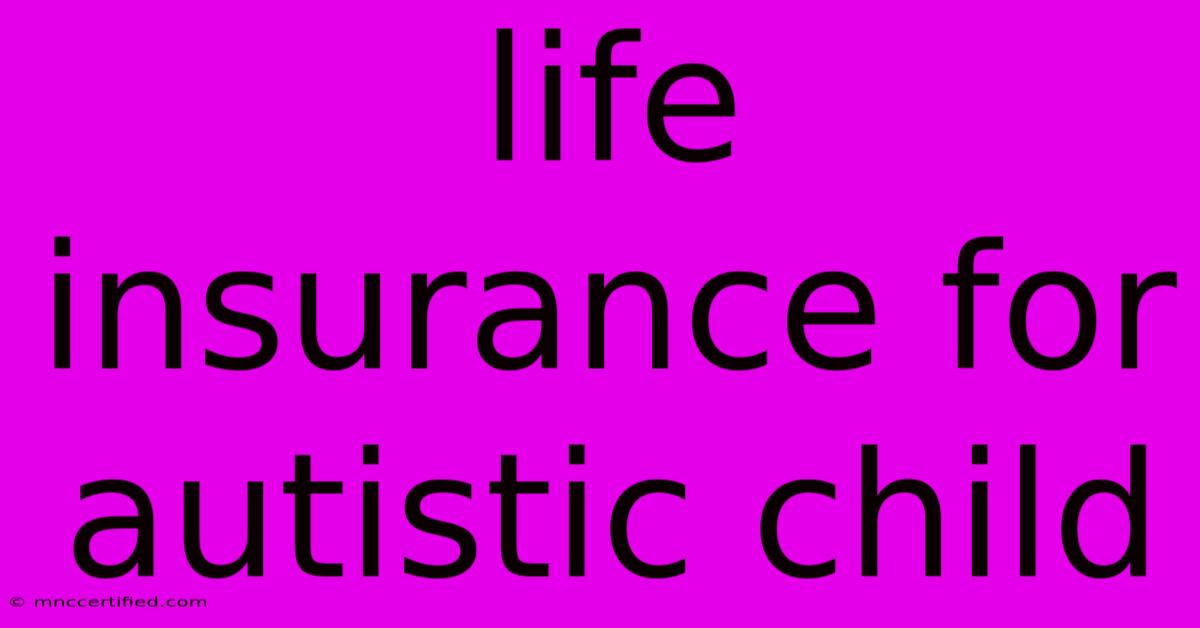Life Insurance For Autistic Child

Table of Contents
Life Insurance for Autistic Children: A Comprehensive Guide
Planning for your child's future is a paramount concern for any parent, and this becomes even more critical when your child has autism. Securing life insurance for an autistic child might seem daunting, but understanding the process and available options can ease your worries and provide crucial financial security. This guide will navigate you through the complexities of obtaining life insurance for your autistic child, addressing common concerns and offering practical advice.
Understanding the Challenges: Why is it Harder to Insure an Autistic Child?
Insurance companies assess risk when determining premiums. Autism, while a spectrum disorder, can present challenges that impact this risk assessment. These challenges may include:
- Increased healthcare costs: Individuals with autism often require specialized therapies, medical treatments, and ongoing care, potentially leading to higher healthcare expenses throughout their lives.
- Potential for reduced earning capacity: While many autistic individuals lead fulfilling and productive lives, some may face challenges in the workforce, potentially impacting their future earning potential. This is a factor considered by some insurers when assessing risk.
- Life expectancy considerations: While life expectancy for autistic individuals varies greatly depending on the severity and associated conditions, some insurers might perceive a higher risk based on generalized statistics. However, this is not always the case, and many insurers focus on the individual's current health.
Types of Life Insurance for Autistic Children:
Several types of life insurance policies can cater to the needs of families with autistic children:
1. Term Life Insurance:
- What it is: Provides coverage for a specific period (term), offering affordable premiums. It's a good option for families seeking temporary coverage to address immediate financial concerns, such as covering funeral expenses or outstanding debts.
- Pros: Relatively inexpensive, easy to obtain, straightforward coverage.
- Cons: Coverage ends after the specified term; doesn't build cash value.
2. Whole Life Insurance:
- What it is: Provides lifelong coverage and builds cash value that grows tax-deferred. It offers a long-term financial safety net, potentially helpful in covering long-term care costs for your child.
- Pros: Lifelong coverage, cash value accumulation, potential for tax advantages.
- Cons: Higher premiums compared to term life insurance.
3. Universal Life Insurance:
- What it is: Offers flexible premiums and death benefits, allowing you to adjust the coverage amount as your needs change. This can be advantageous as your child grows and their care needs evolve.
- Pros: Flexibility in premiums and death benefit adjustments, potential for cash value growth.
- Cons: Can be more complex than term life insurance, and premiums may fluctuate.
Finding the Right Policy: Tips for Parents
- Full Disclosure is Key: Be completely transparent about your child's diagnosis and any associated health conditions when applying for life insurance. Withholding information can lead to policy denial or complications later on.
- Consult with Multiple Insurers: Different insurers have varying underwriting guidelines. Comparing quotes from several companies ensures you get the best possible coverage and premiums.
- Consider the Long-Term: Think about your child's future needs and select a policy that addresses those needs. If you anticipate high long-term care costs, whole life or universal life insurance might be worth considering.
- Work with an Independent Agent: An independent insurance agent can provide unbiased advice and help navigate the complexities of the insurance market. They can help you compare policies from multiple insurers and find the best fit for your family's specific situation.
- Review Policy Details Carefully: Before signing anything, thoroughly review the policy documents to understand the coverage, limitations, and exclusions.
Addressing Specific Concerns:
- Pre-existing conditions: Many insurers consider pre-existing conditions during the underwriting process. Providing complete medical history will help the insurer assess the risk accurately.
- Future needs: Life insurance can help cover expenses related to specialized education, therapies, and ongoing care for your autistic child.
Planning for the Future:
Securing life insurance for your autistic child is a proactive step towards ensuring their future well-being and providing financial security for your family. While it might present initial challenges, understanding the process, choosing the right policy, and having open communication with insurance providers will greatly assist you in making informed decisions. Remember, proper planning today can alleviate significant financial stress in the future.
Disclaimer: This article provides general information and should not be considered financial or legal advice. Consult with a qualified financial advisor and insurance professional for personalized guidance.

Thank you for visiting our website wich cover about Life Insurance For Autistic Child. We hope the information provided has been useful to you. Feel free to contact us if you have any questions or need further assistance. See you next time and dont miss to bookmark.
Featured Posts
-
Fargo Moorhead Insurance Fargo Nd
Nov 19, 2024
-
Insurance Companies Orangeburg Sc
Nov 19, 2024
-
Uefa Nations League Draw Results
Nov 19, 2024
-
Bo Nix Denvers Offensive Rookie Impact
Nov 19, 2024
-
Orthopedic Cost Without Insurance
Nov 19, 2024